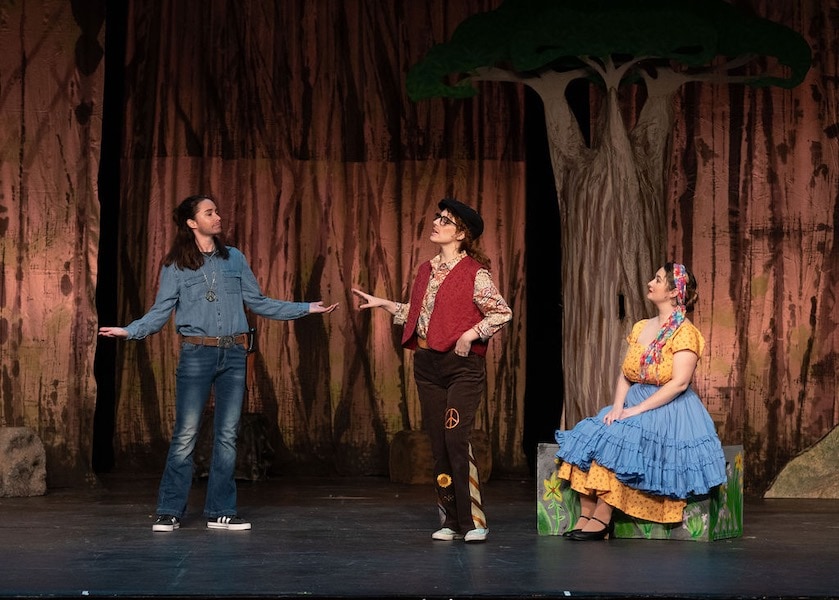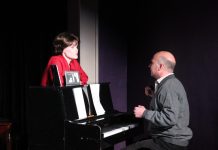Interview by Michelle Hessel and Lauren Pacuit
While the British Players have been dedicated to providing high-quality British theater to the DC area since 1964, this is only the company’s third time tackling Shakespeare himself. The British Players’ production of As You Like It opens on March 17 and runs through April 1. The company feels lucky to have been able to snag Fred Zirm, an experienced Shakespearean director, to helm the production, and after multiple COVID delays (the original production was designated for spring 2021!), the team is excited to finally see this romantic comedy come to life on the Kensington Town Hall stage.
Producers Michelle Hessel and Lauren Pacuit interviewed Fred Zirm about his career in theater and the upcoming production.

Tell us how you got started in theater and directing.
While I was working on my M.A. in English, I had a professor who required that we put on scenes from the plays we were studying, both contemporary and Shakespearean. I discovered I liked acting and, even more, I liked thinking about how to stage scenes. Through the theater courses I was required to take when I got my M.F.A. in playwriting, I learned that I loved directing. When I graduated, college jobs were scarce, so I looked into the independent school market. That’s how I ended up at Landon in Bethesda. At first, I saw it as a stepping stone to college teaching, but I ended up enjoying teaching and directing middle school and high school students and stayed there for 39 years. This is my twelfth Shakespeare production, including one-act versions with the Landon middle school, and my fourth time directing As You Like It. (If you’re counting, I’ve directed Twelfth Night twice, A Midsummer Night’s Dream twice, and once each for Love’s Labour’s Lost, Julius Caesar, Much Ado, and Macbeth.)
Fourth time directing As You Like It! What is it about this play that you keep coming back to it?
When I was a freshman in high school, it was the first play by Shakespeare I ever read. (I still have my 45-cent Folger edition from the time.) Based on the notes I took, Mrs. Fletcher did a good job teaching it. I can’t pretend I understood everything, but I was hooked. Since then, I have seen some 16 productions of it, done in all sorts of ways in all sorts of venues: an all-male production by Britain’s National Theatre, more conventional productions at Sidwell Friends and the American Shakespeare Center, one set in the 1940s at the Chautauqua Theater company, and, yes, even a couple with a general hippie vibe but none of the specifics of this production.
At Landon, I directed As You Like It three times: one full version with the high school and two shorter versions with the middle school. The latter were condensed even further and taken to the Folger Secondary School Shakespeare Festival.

You’ve set this production in the late 1960s/early 1970s. Why did you connect the material to this time?
Part of it is personal nostalgia. It is a time I associate with my youth since I was attending college then. And this is a play that focuses, to a large extent, on young love. Aside from personal associations, I also feel that the late ’60s/early ’70s, and particularly the time of Woodstock, was the last time peace, love, and harmony seemed possible to large groups of people despite all the strife over Vietnam, civil rights, etc. That is a vision we sorely need today during this period of intense polarization. The characters learn to appreciate differences and agree to disagree rather than becoming sworn enemies.
You’ve cast this production with a small cast and actors are playing multiple roles. Tell us about the significance of the cast size as it relates to Shakespearean times and also the challenges and rewards of using the smaller cast.
First of all, our cast size of 15 roughly corresponds to the size of Shakespeare’s company. So, although we are setting the play in the 20th century, the cast size and the minimalist set are both reflective of the original practices of Elizabethan England. With this play, in particular, the small cast with many of the actors taking on more than one role reflects the central idea that “All the world’s a stage… and one man in his time plays many parts.” The fact that some male roles are also being played by actors that do not identify as male also emphasizes the issue of gender that arises in even a conventionally cast production as Rosalind disguises herself as Ganymede, a boy. These are some of the rewards of using a small cast, plus the delight the audience can take in seeing one person act so differently. The challenges are mostly technical and center on two things: making impossibly quick costume changes for those actors playing different roles in consecutive scenes and making sure that one of the actor’s parts does not seep into another. (We have a little fun with that idea as Ganymede becomes Rosalind again for the wedding.)
You hired an intimacy coordinator for this production. This is a new but important role for theater productions. Can you tell us why you chose to have one and what it brings to the production?
I did not use an intimacy choreographer until last year with A Christmas Story (not exactly an X-rated show) at Silver Spring Stage, where they require one. To be honest, I was a little skeptical about needing an intimacy choreographer since I had functioned without one for some 46 years of directing. But I found that the protocols and process that Helen Aberger established helped the actors become comfortable in setting boundaries, speaking up for themselves, and separating their role from themselves as a person. That’s why I wanted Helen on board with this production, especially in the time of COVID. Besides, she is an experienced stage director as well and has provided me with valuable feedback on the show in general.

What can an audience expect out of this production? What are some things that have surprised you?
Audiences can expect a high-energy production that avoids any stereotypes they may have about stuffy Shakespearean actors. Instead, we have tried to find analogs for Shakespeare’s original intent in the culture of the Woodstock era and of today. You will hear hippies, mobsters, country folk, and a Valley Girl, among others, on our stage. I was surprised to have so many young, talented actors come out for the play, as well as some older veterans. (Community theater auditions often skew older.) The two generations in the script are truly represented on stage as well. It has also been a pleasant surprise to find that the music we’ve had to use in place of my original choices works even better than the songs I first wanted. [Producer note: musical changes had to be made based on available performance rights.]
What would you tell someone about coming to see the show who might think that Shakespeare isn’t for them?
Try to let go of your prejudices and be open to what this production offers. Yes, some of the language may be difficult to follow word-by-word, but I think the general drift of the speeches and the shape of the overall story will be clear. I also suspect you will be surprised by how comic and even silly Shakespeare’s comedies actually are while still retaining some deeper resonance.
What has your favorite thing about this production been so far?
How the actors keep making fresh discoveries that are fresh for me as well, even though I have loved this play for a long time — a testament both to their talent and Shakespeare’s richness. I love this play because it manages to stay in the light while acknowledging the dark (“mere oblivion”) and features a lead character in Rosalind that is sad and silly, panicky and self-assured, selfish and selfless, slow on the uptake and quick-witted… in other words, fully human.
As You Like It by William Shakespeare plays Fridays through Sundays March 17 to April 1, 2023, presented by the British Players performing at the Kensington Town Hall, 3710 Mitchell Street, Kensington, MD. For tickets ($15-$28), go online.
COVID Safety: Masks are encouraged but not required.





